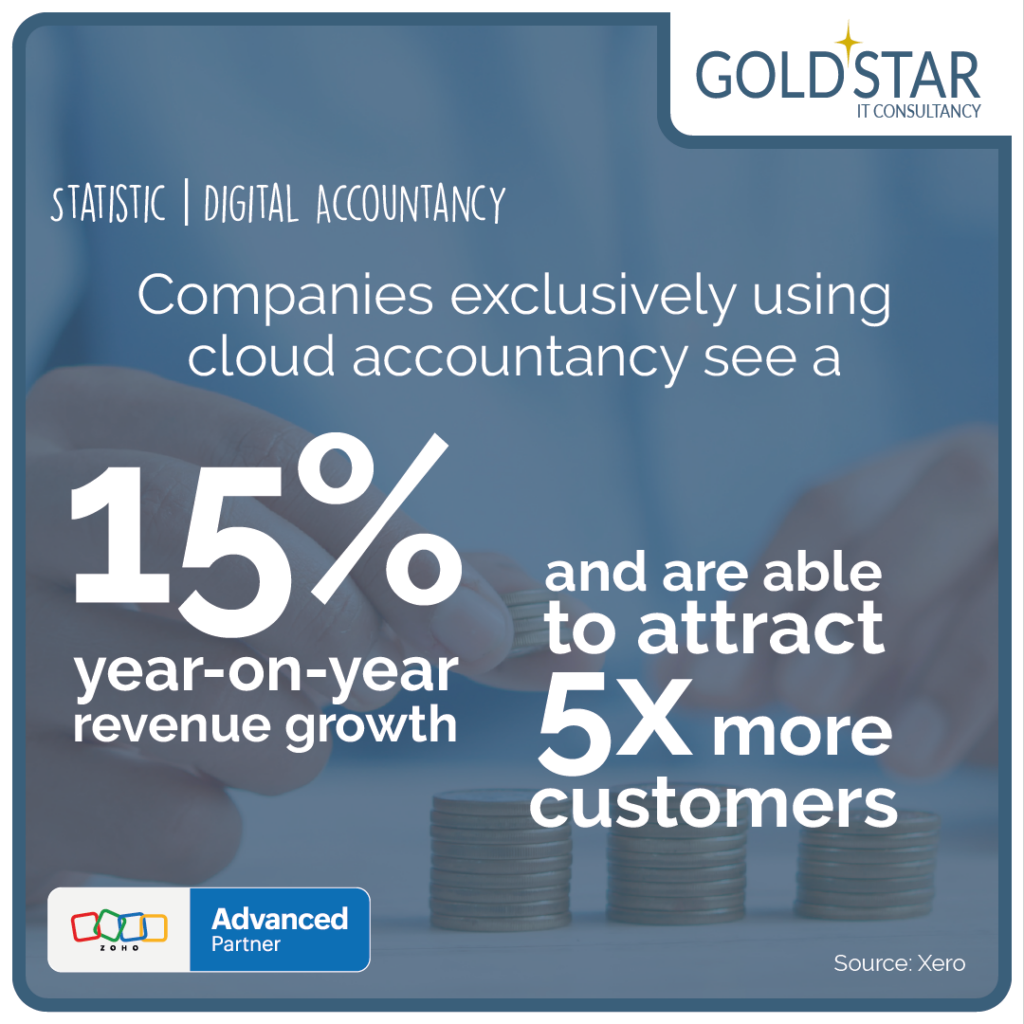Why switch to Cloud-Based, Digital Accountancy?
According to Xero, the companies that use cloud accounting exclusively saw a 15% growth in the year-over-year revenue pattern and were also able to get five times the total number of customers than the companies that don’t use cloud accounting exclusively.
Furthermore according to Forbes, the cost of labour is reduced by 50% with the help of cloud accounting.
Today, more than ever, businesses are reshaping their financial landscapes through advanced tools. Cloud-based, digital accountancy has emerged as a game-changer, offering unparalleled benefits for businesses of all sizes.
Let’s delve into why making the switch to digital accounting is essential for modern businesses seeking efficiency, agility, and growth.

What is Cloud-based Digital Accountancy?
Cloud-based digital accountancy represents a revolutionary approach to managing financial tasks and processes using advanced technology and online platforms. At its core, cloud-based digital accountancy leverages the power of the cloud to provide anytime, anywhere access to financial data and tools, transforming the way businesses handle accounting tasks.
Cloud-based Digital Accountancy represents more than just a software solution; it embodies the shift towards a future where financial tasks are easily integrated, automated, and accessible in real-time. Whether you’re a small business or an established enterprise, it paves the way for efficient financial management, ensuring that your processes keep pace with the demands of the modern business landscape.
Zoho Books stands out as a comprehensive cloud-based digital accountancy solution designed to simplify and elevate financial management for businesses. As part of the Zoho suite, it integrates with other business applications, providing a holistic approach to operations. Discover more about Zoho Books here.


Why make the change to cloud-based digital accounting?
Embrace cloud-based solutions for growth
The shift to cloud-based, digital accountancy isn’t just about adopting new software; it’s about embracing innovation to drive growth. With cloud accounting solutions, businesses gain access to real-time financial data, enabling informed decision-making and strategic planning. This agility is crucial in today’s competitive landscape, allowing businesses to adapt quickly to changing market conditions and seize opportunities for expansion.
Enhance collaboration and accessibility
Digital accounting brings collaboration to the forefront, allowing teams to work together seamlessly regardless of their location. With cloud-based platforms, multiple users can access and update financial data simultaneously, eliminating the need for back-and-forth emails or file sharing. This level of accessibility not only improves efficiency but also enhances transparency and accountability within the organisation.
Streamline processes, save time and increase accuracy
Traditional accounting methods often involve manual data entry, tedious reconciliations, and paper-based workflows. In contrast, digital accounting automates many of these processes, saving valuable time and reducing the risk of errors. Tasks such as invoicing, expense tracking, and bank reconciliation can be completed with just a few clicks, freeing up resources to focus on strategic initiatives and business growth.
Ensure security and compliance
Security is a top priority for businesses, especially when it comes to financial data. Cloud-based accounting solutions offer robust security measures, including data encryption, regular backups, and multi-factor authentication, to protect sensitive information from unauthorised access or cyber threats. Moreover, these platforms often come with built-in compliance features, helping businesses adhere to regulatory requirements and industry standards effortlessly.
Optimise cost efficiency
Transitioning to cloud-based accounting can lead to significant cost savings for businesses. With traditional accounting software, upfront costs for licenses, hardware, and maintenance can add up quickly. In contrast, cloud-based solutions typically operate on a subscription model, allowing businesses to pay only for the features and services they need. This pay-as-you-go model not only reduces upfront investment but also eliminates the need for costly upgrades or infrastructure maintenance.
Simplified integration and scalability
One of the most significant advantages of cloud-based accounting is its easy integration with other business systems and applications. Whether it’s CRM, inventory management, or payroll, digital accounting platforms can sync data across multiple platforms, ensuring consistency and accuracy across the organisation. Moreover, cloud-based solutions are inherently scalable, allowing businesses to adapt and grow without outgrowing their accounting software.
Unlocking the power of cloud-based, Digital Accountancy
Revisiting the statistic, and seeing the features it can unlock, it’s clear to see the benefits of digital accountancy, especially harnessing cloud accounting…
The evidence is clear: companies adopting Digital Accountancy solutions are getting more information, more quickly, reducing the time between completing work, invoicing and receiving payment, all while reducing, and even automating, labour intensive processes.
The benefits are obvious but lets just compare the impact across two businesses, one with and one without Digital Accountancy.
Navigating financial realities with and without cloud-based, Digital Accountancy
Business A:
A beacon of efficiency with Digital Accountancy
In the realm of modern financial management, Business A stands tall as a testament to the transformative power of digital accountancy.
Streamlining their financial processes with automated invoicing, real-time expense
tracking, and simplified bank reconciliation, Business A has achieved unparalleled efficiency.
The benefits extend beyond mere numbers;
they enjoy instant access to insightful financial reports, empowering data-driven decision-making.
Collaborative endeavors thrive in a secure digital environment, fostering an exchange of financial information among teams, accountants, and clients.
Business B:
Tackling challenges without Digital Accountancy
In stark contrast, Business B grapples with the challenges of traditional financial management practices.
Manual invoicing processes lead to delays, affecting cash flow and customer relationships. Tracking expenses in real-time proves elusive, resulting in discrepancies and hindered financial accuracy. Bank reconciliation becomes a tedious task prone to errors, contributing to a lack of confidence in financial records.
Access to timely and insightful financial reports is limited, impacting strategic planning.
Collaboration, confined to traditional methods, hampers efficiency and leaves room for silos across the business.
Benefits of Digital Accountancy
- Effortless Invoicing
Business A accelerates its billing process, creating and sending professional invoices with ease. - Real-Time Expense Tracking
Accurate and up-to-date financial records are maintained through real-time tracking of expenses. - Bank Reconciliation Automation
Speed is increased and errors are minimised with automated reconciliation process. - Insightful Financial Reports
Instant access to comprehensive
financial reports aids strategic planning and decision-making. - Secure Collaboration
Teams collaborate securely, creating a harmonious financial environment for all stakeholders.
Challenges without Digital Accountancy
- Invoicing Delays
Manual invoicing processes lead to delays, affecting cash flow and customer relations. - Expense Tracking Discrepancies
Real-time expense tracking is challenging, leading to discrepancies and inaccuracies in financial records. - Tedious Bank Reconciliation
Manual reconciliation processes prove tedious and error-prone, impacting financial accuracy. - Limited Financial Insights
Lacks timely access to comprehensive financial reports, hindering strategic planning. - Collaboration Inefficiencies
Traditional collaboration methods hinder efficiency and contribute to miscommunication among teams.
Looking at these two business narratives, the differences in efficiency and effectiveness become evident. Business A thrives in the digital era, leveraging the benefits of digital accountancy for a simplified financial journey. Business B, grappling with challenges, struggles to move forward or even survive, wasting resources and unable to drive growth. The choice is clear: Embrace the future with digital accountancy or continue navigating challenges and inefficiencies.
Are you in full control of your business finances?
Are you ready to transform your business’s financial management? Take a moment to reflect on these specific aspects of your accounting process:
Reach out to your team (or try yourself) and ask these questions. You’ll get an instant idea of the effectiveness of your current decision-making model!

Invoice Tracking
How long does it take to create and send an invoice to a client?
If you find this process cumbersome, time-consuming, or prone to errors, it might be a sign that your invoicing system could benefit from a digital overhaul.
Payment Tracking
How do you track and follow up on overdue payments?
If chasing late payments feels like a constant struggle, there’s room for improvement in payment tracking and collections.
Financial Reporting
How long does it take to generate a comprehensive financial report for your business?
If the process is time-consuming and requires manual effort, it might be worth exploring ways to streamline and expedite this critical function.
Return filing
Are you confident in the accuracy and integrity of the financial data in your return?
If doubts linger about the reliability of your financial reports, it’s essential to address data quality and validation to make informed business decisions.
Reflecting on these aspects can reveal opportunities for improvement. Explore digital accountancy solutions or leverage Zoho Books’ robust features to enhance the speed, accuracy, and overall effectiveness of your Digital Accountancy.
Make the switch to cloud-based Digital Accountancy, today
In conclusion, the benefits of switching to cloud-based, digital accountancy are undeniable. From enhanced collaboration and accessibility to streamlined processes and cost efficiency, digital accounting solutions offer a wealth of advantages for modern businesses.
By embracing innovation and harnessing the power of the cloud with solutions like Zoho Books, businesses can future-proof their financial operations and pave the way for long-term success. If you’re ready to elevate your financial practices, we’re here to help you every step of the way. Make the switch to cloud-based digital accounting today and unlock new possibilities for growth and prosperity.
